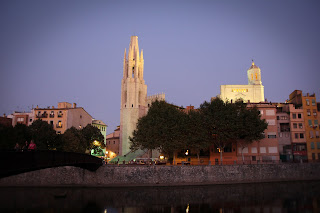Hello again!

We've had the opportunity to accompany Valerie to many different locations that demonstrate both her work in her ministry in France and the culture of the people to whom she ministers. I'd like to step through some of our experiences with you all, accompanying each synopsis with a photo example. Here we go!

"Bonjour!" We were greeted by a short, kind-faced man at the gates of a ranch-style home. He introduced himself as Andre ("In English, I am Andrew!") and quickly showed us inside. Soon we met his wife Marinette, who welcomed us warmly and said (in French), "Make yourself at home!" A steady trickle of locals filed into the house over the next half-hour and took their places around a great, long dinner table, Bibles in hand. Most of those in attendance were made up of retirees or stay-at-home mothers as it was only 2:30 in the afternoon. Valerie took her spot at the head of the table and opened the meeting in prayer. Afterwards, everyone turned to the passage in Acts being studied and, in turn, began to read the passage aloud in French. Throughout the reading, Valerie would pose questions to the group to prompt discussion about aspects of the passage. Though I speak little French, I could tell the conversation was genuine, focused and deep. Around 4, the group ceased their study and prayed earnestly for one another before leaving.

Large wooden doors swing open with a creak. Inside, all is dark; we must carefully grope our way to a light switch. Once the room is illuminated, we see that its modern interior belies its ancient stone facade. The English class takes place in a Reformed Protestant church which seems to be more geared to drawing in people near my age bracket (mid-late 20s). Teaching begins in a small Sunday School room at the back of the church. The students themselves range widely in age and background, but they share one thing in common: a desire and willingness to learn. Today, Valerie is teaching her students location modifiers, so they run through different drills and exercises ("The bank is next to the bakery", "Freda is sitting next to Jacques"). If one student stumbles in their speech, the others step in to help them understand. Oftentimes, someone makes a joke in French and laughter fills the room. It's obvious these people have grown to care for one another and for Valerie. As they leave for the evening, they issue a chorus in English of "Good night!" Valerie smiles.

The city streets overflow with people. I hear at least four distinct languages being spoken within earshot: French, German, Italian and British English. Large booths have been set up in the middle of the square where vendors peddle their wares. Along the perimeter of the square, the cafes and restaurants nearby are teeming with visitors, all talking, eating, laughing, living. The surrounding architecture adds to the liveliness of the people; ornate stone and marble statues look down on the citizens below. Amongst these people, Valerie has told us, only 1% of them are Christ followers. One in one-hundred souls going about their lives in this magnificent place would count Christ as their Savior and Lord. Such magnificence indeed masks a greater spiritual darkness.

Twin spires twist upwards to meet a clear azure sky. The gargoyles set on the walls above survey their ward with old, menacing eyes as they have for centuries. Cathedrals such as Cathédrale Saint-Pierre are commonplace in Europe, but no less spectacular. They are a constant reminder of Catholic influence in these lands, for better or for worse. In more recent generations, Valerie noted, such landmarks are regarded more as historical relics than spiritual centers. For the young, they are simply another part of France's celebrated and storied past now.

The large, intricate Porte du Peyrou pictured above pays homage to King Louis XIV and some of his most well known achievements during his rule. Rendered in Roman style, the arch tells the tale of the king's conquests of the Dutch and the Revocation of the Edict of Nantes, which allowed persecution of Protestants by the Catholic church. Adorned by the French flag, this edifice reinforces both Roman and Catholic influences in France. It also stands as a reminder that Protestants and their ilk have long been unwelcome in France. Though they are no longer hunted in the streets and burned as heretics, the small number of Protestants churches of any kind is noticeable in Montpellier. The French church that Valerie works with is one of just a handful of Protestant churches in Southern France.

The Mediterranean coast is a large draw for many that travel to Montpellier. Many French make it their vacation spot of choice, as do many other Europeans. As a side-effect of the beach community, things tend to be more laid back in Montpellier than some other locations in France. It's not uncommon to see folks strolling around town in their beach gear. Beach-goers enjoy a variety of activities: swimming, sun-bathing, fishing on the rocks, juggling a soccer ball. The proximity to the ocean also heavily influences the local cuisine, with fish and mussels being a common find on most menus.
This ends our tour through the past several days filming in Montpellier with Valerie. I hope to post about our trip out to Nimes and Avignon soon, so stay tuned!
Derek and Patrick


































